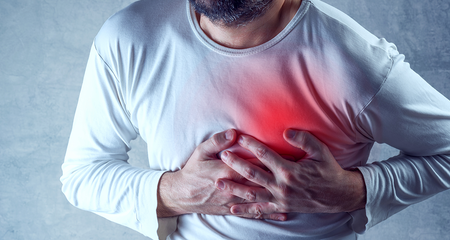The cardiac catheterization laboratories, or cardiac cath labs, at Froedtert Hospital and Froedtert Menomonee Falls Hospital are used to diagnose and treat patients with acute coronary disease and heart attack. Both cath labs are open 24/7 to meet the needs of patients experiencing a cardiac event. Each lab is equipped with the most advanced digital imaging technology available and offers life-saving procedures like angioplasty and stent placement to open blocked arteries.
Cardiac catheterization offers a minimally invasive way to diagnose coronary artery disease (CAD), peripheral artery disease (PAD) and structural heart disease. It involves making a small incision in the groin or wrist (radial catheterization) to access an artery. A catheter (a thin, flexible tube) is then placed in the artery and moved up to the heart to diagnose or treat heart conditions.
Diagnostic Catheterization
Diagnostic catheterization (angiography) is done to obtain information about the heart and its function. After guiding a catheter to the area being examined, a “dye” is injected through the catheter and X-ray images are taken to determine the presence of blockages in the arteries.
Catheterization to Unblock Arteries, Repair Heart Problems
Interventional catheterization is done as a treatment to open blocked coronary arteries or repair structural problems in the heart. Also known as endovascular procedures, these non-surgical treatments are performed from inside the blood vessel.
Procedures include:
- Angioplasty and coronary artery stent placement
- Atherectomy (to remove plaque from arteries)
- Balloon angioplasty or percutaneous transluminal coronary angioplasty (PTCA)
- Thrombolysis (to remove clots from arteries)
- Valvuloplasty (to open a heart valve)
- Closure of PFOs and ASDs (holes in the heart).
Our interventional cardiologists, and vascular and interventional radiologists are among the most experienced in the region performing diagnostic and interventional catheterization procedures.
Learn more about angioplasty and catheterization procedures and the exceptional care available through our Coronary Artery Disease Program.
The Society for Vascular Surgery's Vascular Quality Initiative (SVS VQI) has awarded Froedtert Hospital three out of three stars for its active participation in the Registry Participation Program. The mission of the SVS VQI is to improve patient safety and the quality of vascular care delivery by providing web-based collection, aggregation and analysis of clinical data submitted in registry format for all patients undergoing specific vascular treatments. The VQI operates 14 vascular registries.
Blogs, Patient Stories, Videos and Classes





